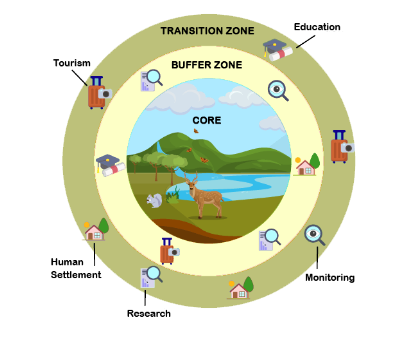Ahmedabad
(Head Office)Address : 506, 3rd EYE THREE (III), Opp. Induben Khakhrawala, Girish Cold Drink Cross Road, CG Road, Navrangpura, Ahmedabad, 380009.
Mobile : 8469231587 / 9586028957
Telephone : 079-40098991
E-mail: dics.upsc@gmail.com

Biosphere Reserves
Context: November 3rd is celebrated as World Biosphere Day. It is celebrated to raise awareness and important about Biosphere reserves.
What are Biosphere reserves?
• Biosphere reserves are protected areas meant for the conservation of plants and animals. They also aim to restore the traditional life of the tribals living in that vicinity.
• Biosphere reserves are identified by the Man and Biosphere Reserve Program to promote sustainable development. This program was initiated by UNESCO in 1971.
• In India, there are 18 Biosphere Reserves established by the government that protect large areas of natural habitats. These include the Nilgiri Biosphere Reserve, Sundarbans Biosphere Reserve, Gulf of Mannar Biosphere Reserve, Nanda Devi Biosphere Reserve, and others
What are the 3 zones in Biosphere reserves?
• Core Zone: This is a legally protected area where human intervention is strictly prohibited. It is the innermost undisturbed ecosystem.
• Buffer Zone: The area surrounding the core zone is the buffer zone. Here only the research and education activities are permitted to humans.
• Transition Zone: It is the peripheral area of a biosphere reserve where human activities like cropping, recreation, forestry, and settlements are permitted with the cooperation of reserve management and local people.
What is the significance of Biosphere reserve?
• Conservation of Biodiversity: Biosphere reserves help conserve the diversity and integrity of biotic communities of plants and animals within natural ecosystems.
• Research and Education: The buffer zone of a biosphere reserve serves as a laboratory for scientists to conduct research on natural phenomena and as a platform for training and education purposes.
• Climate Change Mitigation: Biosphere reserves play a crucial role as carbon sinks, absorbing carbon dioxide and contributing to climate change mitigation.
• Cultural Preservation: They help to restore and preserve the traditional life of the tribals living in that vicinity.
• Home to countless species: They provide home to countless unique and endangered plants and animals species.
• Sustainable development: In addition to playing a vital role in the protection of biodiversity, they also provide opportunities for sustainable economic development.
Threats faced by Biosphere reserves
• Deforestation, Invasive species, Land use changes such as mining, Man-animal conflicts, and Increasing urbanization.
Conservation initiative
• In the Gulf of Mannar Biosphere Reserve in India, local communities are contributing towards conservation efforts by forming self-help groups, while the youth are getting engaged in eco-tourism.
• It has also introduced the concept of ‘plastic checkpoints’. Community members check all vehicles and tourists for plastic waste, which is collected, recycled and used for the construction of roads.

Address : 506, 3rd EYE THREE (III), Opp. Induben Khakhrawala, Girish Cold Drink Cross Road, CG Road, Navrangpura, Ahmedabad, 380009.
Mobile : 8469231587 / 9586028957
Telephone : 079-40098991
E-mail: dics.upsc@gmail.com
Address: A-306, The Landmark, Urjanagar-1, Opp. Spicy Street, Kudasan – Por Road, Kudasan, Gandhinagar – 382421
Mobile : 9723832444 / 9723932444
E-mail: dics.gnagar@gmail.com
Address: 2nd Floor, 9 Shivali Society, L&T Circle, opp. Ratri Bazar, Karelibaugh, Vadodara, 390018
Mobile : 9725692037 / 9725692054
E-mail: dics.vadodara@gmail.com
Address: 403, Raj Victoria, Opp. Pal Walkway, Near Galaxy Circle, Pal, Surat-394510
Mobile : 8401031583 / 8401031587
E-mail: dics.surat@gmail.com
Address: 303,305 K 158 Complex Above Magson, Sindhubhavan Road Ahmedabad-380059
Mobile : 9974751177 / 8469231587
E-mail: dicssbr@gmail.com
Address: 57/17, 2nd Floor, Old Rajinder Nagar Market, Bada Bazaar Marg, Delhi-60
Mobile : 9104830862 / 9104830865
E-mail: dics.newdelhi@gmail.com